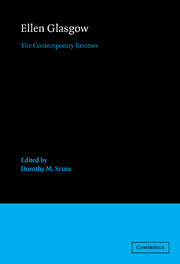Book contents
- Frontmatter
- Contents
- Series Editor's Preface
- Preface
- Acknowledgments
- Introduction
- The Descendant (1897)
- Phases of an Inferior Planet (1898)
- The Voice of the People (1900)
- The Battle-Ground (1902)
- The Freeman and Other Poems (1902)
- The Deliverance (1904)
- The Wheel of Life (1906)
- The Ancient Law (1908)
- The Romance of a Plain Man (1909)
- The Miller of Old Church (1911)
- Virginia (1913)
- Life and Gabriella (1916)
- The Builders (1919)
- One Man in His Time (1922)
- The Shadowy Third and Other Stories (1923)
- Barren Ground (1925)
- The Romantic Comedians (1926)
- They Stooped to Folly (1929)
- The Sheltered Life (1932)
- The Old Dominion Edition of the Works of Ellen Glasgow (1929-33)
- Vein of Iron (1935)
- The Virginia Edition of the Works of Ellen Glasgow (1938)
- In This Our Life (1941)
- A Certain Measure (1943)
- Index
The Romantic Comedians (1926)
Published online by Cambridge University Press: 04 May 2010
- Frontmatter
- Contents
- Series Editor's Preface
- Preface
- Acknowledgments
- Introduction
- The Descendant (1897)
- Phases of an Inferior Planet (1898)
- The Voice of the People (1900)
- The Battle-Ground (1902)
- The Freeman and Other Poems (1902)
- The Deliverance (1904)
- The Wheel of Life (1906)
- The Ancient Law (1908)
- The Romance of a Plain Man (1909)
- The Miller of Old Church (1911)
- Virginia (1913)
- Life and Gabriella (1916)
- The Builders (1919)
- One Man in His Time (1922)
- The Shadowy Third and Other Stories (1923)
- Barren Ground (1925)
- The Romantic Comedians (1926)
- They Stooped to Folly (1929)
- The Sheltered Life (1932)
- The Old Dominion Edition of the Works of Ellen Glasgow (1929-33)
- Vein of Iron (1935)
- The Virginia Edition of the Works of Ellen Glasgow (1938)
- In This Our Life (1941)
- A Certain Measure (1943)
- Index
Summary
A. Hamilton Gibbs, “Victorian Group Contrasted with One of Present Day in Attitude Toward Sex” New York Evening Post Literary Review, 11 September 1926, sec. 3, p. 4
What May Sinclair did for a Vicar in the Cure of Souls Ellen Glasgow does for a Judge in The Romantic Comedians, with this difference, that to the dissection of an elderly gentleman she has added the oldest French plot in the world, that of le cocu. At the hands of the French it has received treatment varying from simple filth to academic psychology, and it goes without saying that Miss Ellen Glasgow has subscribed to the latter method.
The Romantic Comedians is a study in contrasts, whose purpose is to show in the light of today the remnants of a group born in the eighteen sixties, emphasis being laid upon their attitude toward sex. The older group is represented first of all by the Judge who, having buried his devoted wife of thirty-six years' standing, is in that state of encroaching decrepitude when the last dying kicks of the old Adam obsess him to the exclusion of all else. His wealth purchases for him a young wife, a girl of twenty-three, a post-war girl to whom the Victorian shams are hateful and who insists on calling a spade a spade. She is allowed to retain enough Victorianism, however, to exclaim that if she doesn't find love she will die! And when she finds it she goes through an orgy of tears and despair before she runs away with it that would have done credit to any Cranford Miss.
- Type
- Chapter
- Information
- Ellen GlasgowThe Contemporary Reviews, pp. 271 - 292Publisher: Cambridge University PressPrint publication year: 1992
- 1
- Cited by

